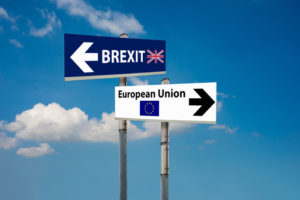 By Steve Lowrie, Lowrie Financial
By Steve Lowrie, Lowrie Financial
There has been a lot of concern about the financial implications of the recent UK referendum to leave the European Union (the “Brexit”).
What should we be doing?
If you have a financial plan in place and your investments are structured to help you pursue that plan, the best thing is to do nothing.
If you have a plan in place but it’s no longer in step with your financial goals, then adjustments may be warranted – but only if your goals have changed, not in reaction to global financial unrest.
If you have had no financial plan, investing instead on best guesses and lucky breaks, the current climate can be your call to action: Focus on putting your own financial house in order and leave the Brexit-fussing to others.
Why has there been so much volatility in the equity and currency markets?
The result of the vote was a surprise, as the bond, stock and currency markets had priced in a “remain” vote. That is, most investors were betting that the “remain” proponents would seize the day. This goes to show that “the market” isn’t always right, and “priced in” is not a sure bet.
When the market’s best guess is wrong, a jolt occurs to adjust to reality. In this case, the reality is that the future implications of this vote remain highly unknown as well. This has created additional uncertainty, and with higher uncertainly, comes higher volatility.
This is the nature of market risks and expected rewards. Near-term volatility happens. Sometimes it happens in big, bad doses but, over time, it’s expected to dissipate into long-term growth.
Why have stock prices dropped?
A drop in general equity prices can be the result of 3 things:
- Lower expectations of corporate profits or cash flows. For example, if the UK left the EU, trade barriers would go up and slow down the general UK economy, suggesting lower corporate profits in the future.
- Higher discount rates. Investors demand a higher expected return to deal with the increased uncertainty, and changes in the economic landscape or regulations.
- Liquidity. Whether by design or through raw panic, some market participants demand immediate liquidity. If they decide to immediately trade this asset for that asset or to exit the market entirely, the price paid to act quickly can be less than advantageous. It’s classic supply and demand.
While #2 might be somewhat theoretical, my take is that most of the volatility created by the Brexit referendum is a combination of all three, but mostly #3.
Why have stock prices dropped outside of the UK and Europe?
The markets have a way of pricing in worst-case scenarios long before they actually occur. In this case, there are those who fear that this vote will, domino-like, create some sort of economic contagion, which will spread to other parts of the world. Global markets have priced in the possibility (although again, this is far and away from being any sort of certainty).
My take is as follows: While the vote result is certainly not good news for the UK economy, and while the UK economy is big, it is not big enough to drag down the whole world’s economy. So, while global financial markets will take some time to adjust (and they may or may not do so in a neat or orderly fashion), there is as much if not more chance that this is a UK issue, rather than a broader global issue.
Should I sell now, with the hope of buying back at lower prices later?
No. I completely understand the temptation when there is increased volatility in financial markets to become more “tactical.” But ultimately, I think it is very important to consider whether you are an investor or a speculator.
If you are a speculator, the horse has already left the barn so to speak. You should have already “positioned” your investments before the vote last week based on your forecast of what might or might not have happened.
As The Reformed Broker observed in a recent post:
For most investors, portfolio construction is more important than portfolio positioning. This is because a retirement portfolio positioned for outrageous unexpected events will likely not be able to do its job over the long term, even if it gets an outlier right here or there.
A well constructed portfolio, on the other hand, is durable and ready for anything.
Is this a buying opportunity?
If you are an investor (which I think is the only way to go), remember that risks and uncertainties are always present in financial markets. Today it is Brexit, previously it was the slowdown in China, US government shutdown, US debt downgrade, the crisis in Ukraine, Greece, bird-flu … you name it. Tomorrow there will be something else.
It is these risks and uncertainties that create the long-term higher rates of return that have been available in equities.
Lower prices, and thus lower valuations today, mean that future expected returns should be higher. The problem is that we don’t know exactly when these higher prices will materialize, so it is very important to be patient.
If you are comfortable with this last point, then maybe this could actually represent a buying opportunity. If your personal circumstances call for holding more equity than you currently do (or more of some of the more risky types), you could be buying them at lower prices at the moment. But you’d best have big, thick blinders – to see you through the potential bumpy ride ahead.
Any final words of wisdom?
Sometimes it isn’t necessarily pleasant being an “equity investor” … but this too shall pass.
 Steve Lowrie holds the CFA designation and has over 20 years of experience dealing with individual investors. Before creating Lowrie Financial in 2009, he worked at various Bay Street brokerage firms both as an advisor and in management. “I help investors ignore the Wall and Bay Street hype and hysteria, and focus on what’s best for themselves.” This blog appeared originally on his site on June 28 and is republished here with permission.
Steve Lowrie holds the CFA designation and has over 20 years of experience dealing with individual investors. Before creating Lowrie Financial in 2009, he worked at various Bay Street brokerage firms both as an advisor and in management. “I help investors ignore the Wall and Bay Street hype and hysteria, and focus on what’s best for themselves.” This blog appeared originally on his site on June 28 and is republished here with permission.
Share this:
- Click to share on X (Opens in new window) X
- Click to share on LinkedIn (Opens in new window) LinkedIn
- Click to share on Facebook (Opens in new window) Facebook
- Click to share on Reddit (Opens in new window) Reddit
- Click to email a link to a friend (Opens in new window) Email
- Click to print (Opens in new window) Print

